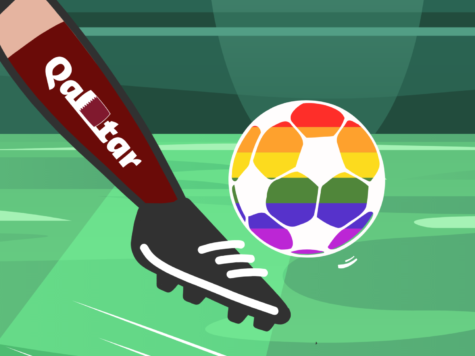Lies and corruption surround 2022 World Cup
December 8, 2022

The 2022 FIFA World Cup in Qatar has been filled with drama and chaos off the field. Qatar had been a controversial choice to host the massive sporting event since they were selected over 12 years ago, and the chaos has only grown since the games began. Qatar has reneged on many of their promises that FIFA and Qatari officials made to fans and teams across the world, pulling the rug out from under them at the last minute.
Just two days before the first match kicked off, Qatar announced that alcohol would not be sold before and during World Cup matches, going back on a promise that was made to FIFA when they won the bid. While alcohol is illegal to drink publicly in the Gulf State, they had promised to lift the ban for the duration of the World Cup for international fans. The unexpected ban allowed a loophole for the extraordinarily wealthy guests, who were allowed to drink beer and wine in luxury boxes.
Qatar has historically had a horrific human rights record, which only continued leading up to the World Cup. The country brought in over two million migrant workers from South Asia to construct entirely new cities and infrastructure for the World Cup. Qatari officials exploit the rights of the migrant workers through a system called Kafala, which gives employers disproportionate rights over their workers.
Hassan al-Thawadi, secretary general of Qatar’s Supreme Committee for Delivery and Legacy, recently stated that there had been between 400 and 500 migrant worker deaths in relation to World Cup projects. This goes against an investigation conducted by The Guardian last year that found that there were over 6500 migrant worker deaths over the past decade. Human rights organizations have reported that FIFA and Qatar have failed to adequately protect migrant workers from extreme heat, greatly risking their health and wellbeing.
The World Cup hosts have been incredibly strict about any expressions of sexuality, especially those of the LGBTQ+ community. Homosexuality is criminalized in Qatar, with a punishment of up to seven years for sexual acts between people of the same sex. Under Qatar’s interpretation of Sharia Law, same-sex acts conducted by men could be met with the death penalty.
FIFA’s president, Gianni Infantino, attempted to clarify before the tournament that all fans would be welcome to come to Qatar regardless of gender or sexual orientation. However, there have been several reports of fans being barred from entering World Cup stadiums for wearing rainbow symbols. Former Welsh soccer player Laura McAlister tweeted that she was blocked from entering a FIFA stadium by security for wearing a rainbow themed hat. Security had told her that the hat was a “banned symbol,” and that she would need to remove the hat to enter the stadium.
The team captains of seven European countries planned to promote diversity and inclusion at the World Cup by wearing “OneLove” rainbow armbands. Hours before the Dutch team’s first match, FIFA announced that captain Virgil Dijk would receive a yellow card immediately if he wore the rainbow armband during the game. A player is ejected if they receive two yellow cards, posing a competitive disadvantage if he wore the armband. All seven teams later announced that their captains would not wear the armband.
FIFA attempted to avoid the PR disaster by stating the captains can wear armbands from the organization’s “No Discrimination” campaign. The armbands notably lack any rainbow symbols that support the LGBTQ+ community. Infantino and FIFA have continued to state their support for the LGBTQ+ community at the World Cup, but their statements ring hollow in the face of all of the attempts to silence them at the tournament.
The match between Portugal and Uruguay drew headlines for a protester that ran onto the field during the match. An Italian fan named Mario Ferri ran onto the field wearing a shirt supporting Ukraine and Iranian women, while carrying a rainbow flag behind him. Ferri later stated that he ran onto the field to protest fans and players being blocked from using rainbow symbols at the World Cup.
Despite all of FIFA’s promises to make the World Cup a safe and inviting environment for all fans, their actions have not reflected their words in Qatar.








Leave a Comment